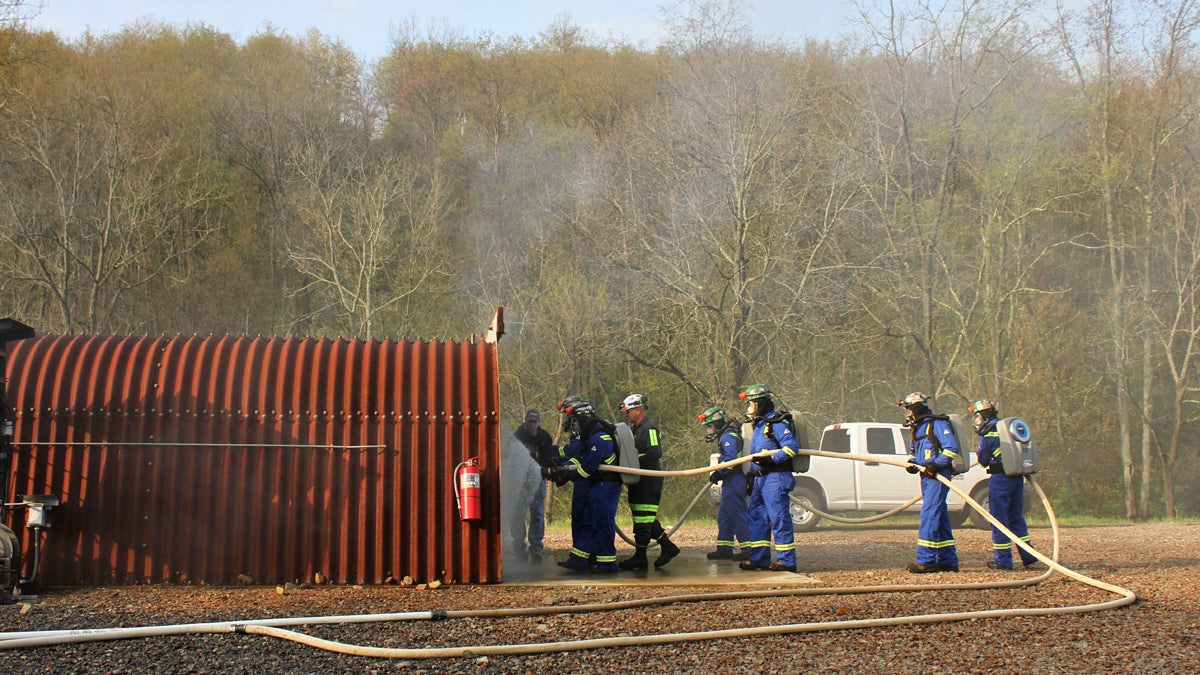In case you missed it: The week’s good reads about Pennsylvania cities

Members of the Mettiki Mine Rescue team prepared for one of the mine rescue competition’s timed events, the live burn: teams contain and then extinguish a fire in the hangar. They wear flame-resistant suits, fire-rated gloves, and breathing apparatuses. (Margaret J. Krauss/WESA)
New podcast episodes have dropped; joblessness is making the white working class sick; and Pennsylvanians’ love affair with Wawa and Sheetz.
You may know him as a comedian. Beloved television star. “America’s Dad.” And now, he’s an accused sexual predator.
On Monday, Bill Cosby faces a jury that will determine whether he’s guilty or not of drugging and sexually assaulting one of more than 60 women who have accused him of sexual misconduct.
Cosby Unraveled explores Cosby’s beginnings in the projects of North Philadelphia, the heights of his influence, and the causes of his downfall. Listen to all three episodes.
In other podcast news, Keystone Crossroads’ latest episode of Grapple grapples with racial tension: York County is one community where racial tension flared around the 2016 presidential elections.
Elected officials posted racially charged content on social media, and a video showed a high school student saying “white power” as other students carried Trump signs the morning after the presidential election. Grapple delved into York County, which is at once unique and representative of many other areas in the commonwealth.
Finally, another episode of Grapple looks at the lives and challenges of Pennsylvania’s coal miners.
Pennsylvania is the nation’s fifth largest coal producer. But far less coal comes out of the ground than it used to. Grapple went to southwestern Pennsylvania, where coal mining is a strong part of the area’s identity, to find out the struggles of a mine rescue team, a retired coal miner, and a former miner.
Lawmakers pressured to regulate the amount of gifts they receive
Pennsylvania has one of the loosest laws for reporting gifts in the country.
As Pa. lawmakers file gift disclosures, advocates across the state are making a renewed push to get lawmakers to impose regulations on the amount of money they can take.
Harrisburg lawmakers accepted more than $145,000 worth of hospitality, gifts, and travel in 2016, according to recently filed financial interest disclosure forms.
We all get things from lobbyists and so forth,” State Rep. Rick Saccone, R-Allegheny, said. “That’s the culture up there.”
Joblessness is making the white working class sick
A Pennsylvania psychiatrist and his colleagues are noticing some of their patients are suffering from addiction and depression. And those trends seem inextricably tied with the current political climate.
Dr. Kenneth Thompson, a Pennsylvania psychiatrist and president of the American Association for Social Psychiatry, said many of his patients fall into a very specific category — they’re white, male, high school-educated, former Democratic voters who supported Donald Trump for president.
Thompson has noticed some troubling mental health trends related to joblessness among their white, working-class patients.
“I wish I could tell you that I didn’t have a large number of people who were family members, people who’ve died from ODs, who haven’t had significant amounts of stress because of unemployment,” he said.
Ousted West Philly tenants win more time
At an emergency hearing with Philadelphia’s Human Relations Commission Thursday, the building owner, Cross Properties agreed to give nine low-income tenants in West Philadelphia an extra month to move out before redeveloping the property for higher-income tenants.
The commission will continue investigating 17 complaints that allege Cross Properties discriminated against Penn Wynn House tenants who receive public assistance during the eviction process.
David Blumenfeld, a managing partner at Cross Properties, denied any wrongdoing and said the company has tried to help all Penn Wynn residents find new apartments.
We heart Wawa and Sheetz
This should not come as a surprise: Pennsylvanians have a love affair with their convenience stores.
“I love Wawa,” said Ben Lampe, a med student at Thomas Jefferson University. His Wawa is located at 9th and Walnut in Center City Philadelphia, a popular stop for hospital employees.
When Lampe went to school in South Carolina, “I always knew the last Wawa in the middle of Virginia, so I’d always have to stop there to get lunch there: tuna salad classic hoagie.”
“I’ll drive out of my way to get gas at a Sheetz,” said Karen Rhoades, who manages one of the Altoona stores. “I eat lunch here for work, but I’ll usually eat dinner at a Sheetz, too. I don’t like to go to any other chain.”
Both store chains are uniformly clean, well-maintained and well-lit. What more could you ask for?
A tale of two wooden streets
Both Philadelphia and Pittsburgh are each home to one of the last wooden streets in the nation.
Wooden streets were about as common 100 years ago as bike lanes are today.
“Wooden streets in Pittsburgh were fairly common,” said Matthew Falcone, president of Preservation Pittsburgh, and a member of the city’s Historic Review Commission. But “as people moved toward automobiles, they just became completely irrelevant. They gradually started to disappear.” Only Roslyn Place remains.
In Philadelphia, S. Camac Street street was lined with granite blocks. They were ripped up and replaced with wooden blocks in 1917, and were covered in asphalt in 2015. But the street is expected to be restored to its wooden splendor in 2018.
WHYY is your source for fact-based, in-depth journalism and information. As a nonprofit organization, we rely on financial support from readers like you. Please give today.


